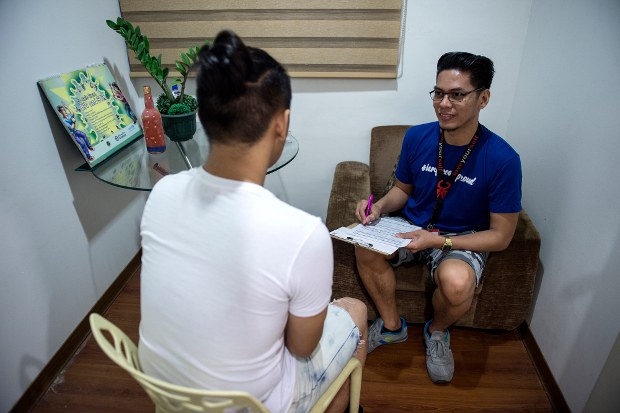Advocates Urge Philippines to Enhance Efforts Against HIV ‘Epidemic’
2017.08.02
Manila
 Health counselor Maiyk Felicitas (right) talks to a man who took a blood test at the Love Yourself Anglo Center in Manila, Dec. 7, 2016.
Health counselor Maiyk Felicitas (right) talks to a man who took a blood test at the Love Yourself Anglo Center in Manila, Dec. 7, 2016.
Philippine human rights monitors and public health advocates called on the government Wednesday to allow greater access to condoms and allow sex education in schools to curb an “epidemic” of the virus that causes AIDS.
This came a day after the United Nations reported that the infection rate for the human immunodeficiency virus (HIV) in the predominantly Catholic Philippines had “become the highest in the Asia-Pacific region.”
Despite the alarming report by the U.N., the government continues to delay the release of “proven low-tech and low-cost” contraception and intervention programs that could address the spread of the virus among men who have sex with men, said Carlos Conde, a Philippines-based researcher for Human Rights Watch.
Conde said the government should immediately remove “official obstacles to condom access and usage, as well as ensure schools include safer-sex and HIV-prevention education in the curriculum.”
The Philippines has recorded the fastest-growing HIV/ADS epidemic in the Asia Pacific region in the past six years, according to the report from the United Nations. It pointed to a 140-percent increase in the number of new infections in the country, from an estimated 4,300 in 2010 to around 10,500 in 2016.
“The worsening severity of the Philippines’ HIV epidemic is unquestionable,” Conde said. “The Philippines government needs to demonstrate it’s finally willing to adequately address it.”
The Philippines is Asia’s bastion of Catholicism in the region, and while Manila and some urban centers are highly modernized, the church still retains considerable influence on daily life and politics.
But the church still frowns on contraceptive use, which has been blamed by health advocates as one of the reasons that contribute to the spread of the virus that causes AIDS.
Conde said the government should also reactivate programs that would help discourage the sharing of injections and needles among drug users, a growing problem particularly in the central city of Cebu.
Dr. Rossana Ditangco, head of the AIDS Research Group at the state-run Research Institute for Tropical Medicine, warned on Monday that “we can’t control the rapid rise of HIV infection.”
140-percent hike
The report by UNAIDS showed that in 2016, a majority of new infections, or about 83 percent, was among men who have sex with men and transgender women who have sex with men.
The rise in infections in the country the past seven years contrasted with the decreasing or stagnant rates of new infections in other parts of the region, the study said.
In fact, the country’s HIV infection rate grew by an alarming 140 percent from 4,300 individuals in 2010 to 10,500 in 2016,
Data from the Department of Health matched the UNAIDS numbers. Health officials said this meant that two out of three among men aged 15 to 24 years old who engaged in sex with men had been infected.
The Philippines is now one of eight countries that account for more than 90 percent of new HIV infections in the region, according to UNAIDS.
“The Philippines has a small window of opportunity to act now and stop a major HIV epidemic from taking hold,” said Eamonn Murphy, director of UNAIDS Regional Support Team for Asia-Pacific, in a statement.
Sen. Risa Hontiveros, deputy head of the Senate committee on health, expressed alarm at the report and urged the government to immediately declare it as a “national emergency.”
She said “stigma” remained one of the key reasons for the spread of HIV.
The government, she said, must focus its time and resources “on this urgent, life and death matter.”
“We cannot afford to lose our young people to this epidemic,” Hontiveros told reporters. “This is a fight we cannot afford to lose.”







